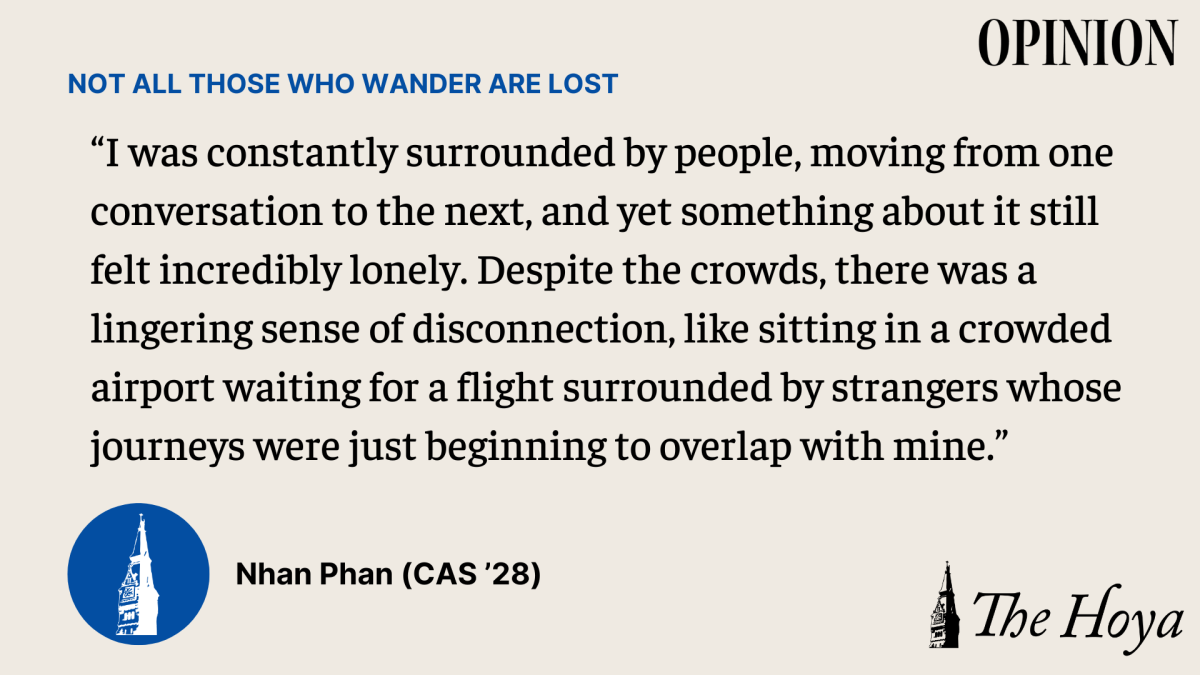
As the night settles in and the aviation lights atop Healy Hall begin to glow, the campus falls into a hush. I ease into my beanbag by the Copley Hall windowsill, switch on my airplane-window neon sign and take a moment to reflect before diving into the book I’ve been reading: “The Life Impossible,” a novel by Matt Haig about a lonely English woman moving to Ibiza, Spain, in pursuit of reinvention.
In the quiet moments, when the noise of the world around us fades, loneliness often slips in like an uninvited guest. For a long time before I began college, I braced myself against it, avoiding solitude whenever I could. I filled the silence with work, group study sessions, dinners, lunches and club meetings. It simply felt unnatural to be alone. Deriving my energy from the presence of others gave me an addictive kind of constancy that made everything feel purposeful. But the more I depended on this constant buzz, the less equipped I felt to handle moments of solitude when they inevitably arrived. Without the usual turbulence of the social world, I felt lost and unsure of what to do — the stillness was unsettling, and I had no familiar cues to follow.
Entering college, I didn’t realize how lonely it was going to be during these first few weeks. Everyone talks of the excitement of meeting new people and the rush of diving headfirst into this new chapter of life. And in many ways, it was exactly that — fresh faces at every turn, new classmates and opportunities to join clubs (and their mixers). I was constantly surrounded by people, moving from one conversation to the next, and yet something about it still felt incredibly lonely. Despite the crowds, there was a lingering sense of disconnection, like sitting in a crowded airport waiting for a flight surrounded by strangers whose journeys were just beginning to overlap with mine. The busy energy was there, but each initial connection felt surface-level. These fledgling connections couldn’t mask the fact that I was still figuring out where I belonged and how to bridge the gap between acquaintances and genuine relationships. I was surrounded but wasn’t truly seen.
Thus, when forced to grapple with this loneliness my first few weeks, I realized the extent to which I had avoided taking care of myself. I had neglected to check in with my emotions or acknowledge the things I was wrestling with internally because my focus was always outward — on others, on activities, on maintaining momentum. It wasn’t until the noise started to fade and those quiet moments became more frequent that I realized something had to change.
Embracing loneliness wasn’t just about learning to be alone; it was about learning to listen to myself, to reflect on what I needed when no one else was there to guide me. I found that quiet moments — journaling, taking walks or even just sitting in silence — allowed me to hear myself more clearly, and I could recognize what I needed emotionally, mentally and physically. It became less about being alone and more about getting to know and understand the person I am in those quiet spaces. I began to understand that solitude, much like a moment of cruising above the clouds, was a time when I could regain perspective and steady myself for whatever was to come.
As a college student, surrounded by so much emphasis on connection and involvement, this can be an especially difficult lesson to learn. For many of us, loneliness feels like an uncomfortable contradiction — these years are supposed to be the most social and engaging years of our lives. But the reality is often different. Loneliness can creep in even when we are surrounded by new people, new opportunities and endless activities. It’s easy to interpret this loneliness as failure — an inability to fit in or to forge deep relationships immediately. But I wonder if that’s not a failure; maybe it’s an invitation to pause, to slow down and to explore who we really are.
As I settle into my beanbag at night, I carve out a moment for myself to breathe. It is about acknowledging the weight of my thoughts and giving them the attention they deserve. And in doing so, I see loneliness not as a void to be filled with activity, but as a space to grow more in tune with myself. I learned that, just like the woman in “The Life Impossible,” sometimes reinvention and self-understanding require a journey inward, away from the noise the world offers.
Embracing loneliness isn’t about shying away from others. It’s about finding comfort in our own presence so that when we re-enter the busyness of life, we do so with a clearer sense of who we are. It’s a practice of becoming steady in our own journey so that no matter how turbulent the trip may get, we can find peace amid the noise. So take a moment to embrace the quiet, listen to your thoughts and reconnect with yourself amid the noise.
Nhan Phan is a first-year in the College of Arts & Sciences. This is the fourth installment of his column, “Not All Those Who Wander Are Lost.”